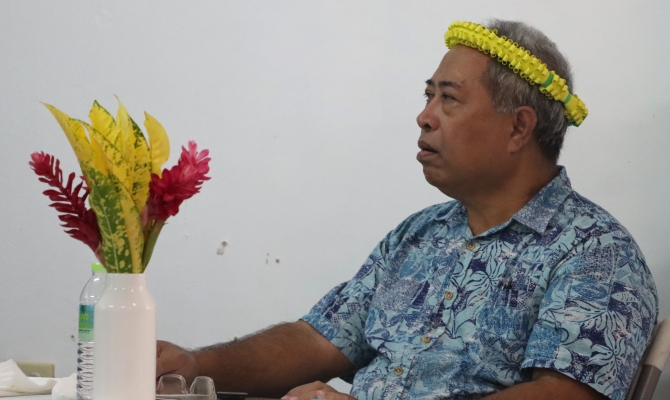
26 August 2024, Pohnpei FSM - The impacts of climate change on the Federated States of Micronesia (FSM) are severe.
According to a recent report by the Pacific Islands Regional Climate Assessment (PIRCA), communities in Pohnpei, Kosrae, Chuuk, Yap and other smaller islands spread across the western Pacific Ocean, are already suffering from hotter temperatures, stronger typhoons and sea level rise threatening housing, drinking water, and transportation, as well as agroforestry, ecosystems, and cultural sites. Ocean changes have already killed corals, impacting tens of millions of dollars that fisheries inject into the FSM economy, annually.
FSM’s Secretary of Environment, Climate Change and Emergency Management, Hon. Andrew R. Yatilman, has seen these impacts worsen over the years. He acknowledges ongoing international efforts to reduce greenhouse gasses but says that unless this global effort ramps up with meaningful outcomes, the future of his green and beautiful country is under threat.
“The current climate change hazards being experienced are expected to continue with more severe impacts,” Hon. Yatilman said. “Coastal populations will face challenges brought about by sea level rise. What it means is that these communities will have to move inland or find higher grounds away from coastal areas. This means we will have to start planning for how to adapt to those eventualities in the near future.”
This week in Pohnpei, FSM is taking a big step towards that direction with the FSM National Adaptation Plan (NAP) Inception and Implementation Planning Workshop. Funded by the Green Climate Fund (GCF) and delivered by the Secretariat of the Pacific Environment Programme (SPREP), the three-day workshop is the biggest national exercise for climate vulnerability for the island nation.
“This NAP is so important because it is an investment that will have a strong bearing on how we effectively address FSM’s current and future vulnerability to climate change,” said Hon. Yatilman.
“We all know that efforts to limit emissions of greenhouse gases are not sufficient. The practical option for small island nations like FSM is to adapt to the impacts of climate change for our people not just to live but to survive.”
The NAP process seeks to identify medium- and long-term adaptation needs, informed by the latest climate science. Once major vulnerabilities to climate change have been identified, the NAP process develops strategies to address them. Through the Readiness Funding from the Green Climate Fund for adaptation planning, FSM will work towards developing an overarching National Adaptation Plan (NAP) through a comprehensive consultative adaptation planning process, evidence base and climate finance investment plan for adaptation including developing potential draft project /programme concept notes which, once approved for funding, will deliver on-ground action.
“DECEM will not be able to implement this project on its own. All government departments at national and state levels, civil societies, private sector, communities and our partners must all work together to develop our National Adaptation Plan that will set out how we adapt to survive the changing climate,” said Hon. Yatilman.
“You are the planners. Remember, when we talk about adaptation plan, we are not talking about infrastructure investment only, we have to identify innovative and creative ways of adapting to a changing climate in our planning for investment infrastructures, health, fisheries, agriculture, schools, ecosystems, just to name a few.”
The total cost of the NAP project is USD2.9 million to be implemented over a period of three years.
This national workshop is the first step to the development of FSM’s Adaptation Plan. Similar workshops will be held in each State which will provide an opportunity for all state level stakeholders to contribute.
The Commonwealth Scientific and Industrial Research Organisation (CSIRO) is engaged by SPREP to undertake climate impact, vulnerability and risk assessment (CIVRA) for all NAP projects including Tuvalu, Nauru, FSM and Niue.
SPREP’s Director of Climate Change Resilience, Ms Tagaloa Cooper said developing adaptation solutions needs to be underpinned by climate science to understand climate impacts that could potentially affect FSM in the medium to long term.
“The pace and speed at which climate finance has been accessed by Pacific SIDS has been raised too many times at COPs and other regional and international fora. SPREP is committed to support its member countries including FSM in accessing climate finance to implement real action on the ground to address observed and potential future climate impacts,” said Ms Cooper.
“The National Inception workshops are the most important part of a project because this is where you set the scene and start the journey for an adaptation plan that is impactful.”
The FSM NAP National Inception and Implementation Planning Workshop is designed to introduce the project, its objectives, activities, intended outputs, approaches and timeline. It will also be an opportunity to consult with national stakeholder on project direction and exchange knowledge of adaptation gaps and needs, challenges and lessons learnt from similar projects, and exchange knowledge on key attributes of the adaptation planning process.